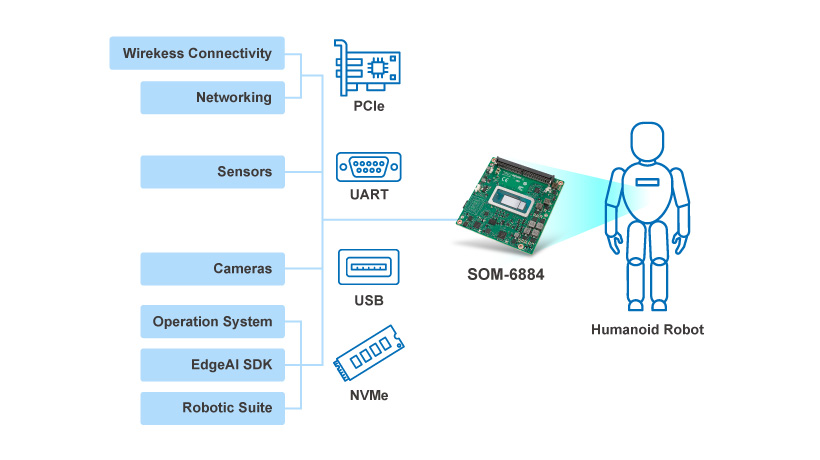Advancing Humanoid Robotics with AI Integration and Scalable Design
11/14/2024
Trends
Humanoid robotics has seen significant advancements recently, particularly with innovations in artificial intelligence (AI). These advancements are enhancing the capabilities of humanoid robots, enabling them to perform complex tasks such as navigating rough terrain, lifting heavy objects, climbing stairs dynamically, and manipulating intricate objects. Humanoid robots are now being integrated into various industries, including logistics, manufacturing, healthcare, education, and the service sector. The market for these robots is expected to grow substantially, taking on repetitive manufacturing tasks and addressing labor shortages across different sectors.
Challenges
Designing and manufacturing humanoid robots involves several key challenges:
- Mass Manufacturing and Scalability:
Developers must design efficient, powerful, and versatile humanoid robots capable of performing repetitive tasks in diverse environments. To achieve this, the robot’s architecture should be replicable, optimized for mass production, and cost-effective by simplifying complex components while maintaining consistent, high-quality manufacturing.The design should also allow for easy upgrades and customization without needing a complete redesign. - Advanced AI Model Training and Deployment:
AI technology enables robots to make autonomous decisions based on sensory input and training data. Robots must adapt to their environment and experiences, improving performance over time. - Reliable Operation:
Efficient power and thermal management is crucial. Providing consistent power for 24/7 operation while keeping the robot lightweight presents a challenge. Additionally, managing the heat generated by the robot's components, particularly for effective cooling within the constrained humanoid form factor, is vital to prevent overheating and ensure reliable performance.
Solutions
The SOM-6884 is a compact module designed for performance scalability and power efficiency, suitable for various industrial and embedded applications in confined spaces.
- Easy Upgrade Path at Scale :
The module feature enables performance upgrades without the need to redesign the entire system. Standardized interfaces and footprints enhance design security and simplify integration with a wide range of applications. This approach makes it easier to scale the system by upgrading to higher-performance processors without altering the carrier board design, ensuring shorter development times, cost efficiency, and faster mass production. - AI-compatible Processor:
Featuring the 13th Gen Intel® Core™ processors with up to 14 cores, 96 EU Graphics, VNNI, and an AI-boosting Vision Processing Unit (VPU), developers can focus on optimizing AI models and inference tasks for their robots, leveraging these advanced AI computing capabilities to improve efficiency at the edge. - Robust Connectivity, On-board Memory, NVMe SSD, and Effective Thermal Solutions:
High-bandwidth interfaces including PCIe Gen4, SATA 3.0, and USB 4.0 ensure high-speed data transfer and connectivity. On-board memory and NVMe SSD reduce latency and enhance power efficiency, while being more resistant to physical shocks. The module is equipped with advanced thermal solution, Quadra Flow Cooling System (QFCS), which ensures optimal thermal performance even under high workloads and in ambient temperatures up to 60°C.

Why Advantech
- Ready-to-Develop Software Environment:
Advantech’s AI development toolkit, EdgeAI SDK, and robotic development software, Robotic Suite, are designed to accelerate AI model development and deployment for robotic applications at the edge. These tools allow developers to focus on software development instead of building AI model from scratch, resulting in reducing the time-to-market. - Innovative Thermal Solution:
The advanced, low-profile Quadra Flow Cooling System (QFCS) is designed to optimize heat dissipation, ensuring that components remain cool even under high workloads. The thin, light, and silent structure is beneficial for applications with space constraints. The system integrates multiple thermal technologies, including dual heat pipes and composite fin structures, to maximize cooling efficiency. These benefits make the QFCS a robust and versatile cooling solution, enhancing the reliability and performance of devices - Embedded Solutions and Design-in Services:
Advantech's Design-in Service offers a One-Stop Service Model that integrates embedded boards, software, and peripherals for a seamless development experience. Collaborating with leading technology partners like Intel, AMD, Microsoft, and NVIDIA, Advantech provides the latest embedded solutions and comprehensive support for BIOS, OS, software APIs, utilities, and remote management software. Leveraging Advantech's extensive expertise and resources helps businesses shorten development cycles, minimize risks, and bring their embedded solutions to market quickly and efficiently.

-25/SOM-6884_01---(1)20230301141809.jpg)



